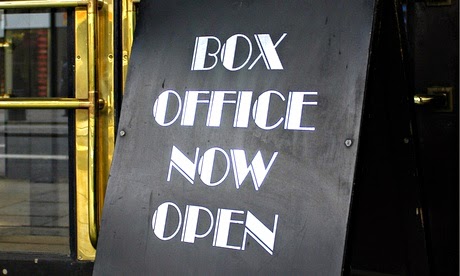Conversations (Part One)
I had an interesting, brief conversation yesterday while I was standing at the Box Office of the theatre I am interning at, that made me even more excited about my inquiry.
One of the patrons had attended both plays that were showing at the theatre yesterday, (I think she was a theatre critic, and she was something to do with an awards ceremony), and as she left I asked her whether she had enjoyed her day.
She responded positively, especially regarding the second of the two productions, telling me that she was going to contact the theatre critic of a major national newspaper to tell him to review the show as she felt it was something very important that needed to be transmitted to a wider audience, and that she would be recommending to her contacts that the play transferred to a larger theatre after their initial run.
Since I am intending to look at audience reactions to new works, this would have been a very useful conversation to pursue longer! She believed that the play carried a strong message and it would have been interesting to find out what she thought the impact could be, beyond the stage.
This is, however, something that I have read about in one of my literature sources, and it is an interesting angle: theatre critics are, by their nature, very invested in the art form and have a lot of knowledge and experience of live performance. Therefore this would mean that they are viewing a piece differently from the 'layman' audience member who has visited for some other purpose rather than writing a review.
Within my SIG there has been a thread of discussion regarding arts criticism, with one critic stating that they feel they are never fully immersed in a production as they are always thinking about the review, coming up with lines or descriptions to use. For an audience member with no agenda, how are they going to react to a performance that carries a strong message or call for change? This is what I am interested in finding out more about.
Image Source: theguardian.com
One of the patrons had attended both plays that were showing at the theatre yesterday, (I think she was a theatre critic, and she was something to do with an awards ceremony), and as she left I asked her whether she had enjoyed her day.
She responded positively, especially regarding the second of the two productions, telling me that she was going to contact the theatre critic of a major national newspaper to tell him to review the show as she felt it was something very important that needed to be transmitted to a wider audience, and that she would be recommending to her contacts that the play transferred to a larger theatre after their initial run.
Since I am intending to look at audience reactions to new works, this would have been a very useful conversation to pursue longer! She believed that the play carried a strong message and it would have been interesting to find out what she thought the impact could be, beyond the stage.
Image Source: isaiahhankel.com
This is, however, something that I have read about in one of my literature sources, and it is an interesting angle: theatre critics are, by their nature, very invested in the art form and have a lot of knowledge and experience of live performance. Therefore this would mean that they are viewing a piece differently from the 'layman' audience member who has visited for some other purpose rather than writing a review.
Within my SIG there has been a thread of discussion regarding arts criticism, with one critic stating that they feel they are never fully immersed in a production as they are always thinking about the review, coming up with lines or descriptions to use. For an audience member with no agenda, how are they going to react to a performance that carries a strong message or call for change? This is what I am interested in finding out more about.





Yes worth pursuing - art criticism is often studied in creative writing? or as you say are the professionals who are knowledgeable in not only the writing but the theatre arts more generally. Bw
ReplyDeleteI think this is one of the points that hasn't been fully explored in theatre: the 'critic' is seen as the barometer of what is good and what is bad, but what about common reception as opposed to critical acclaim? The best example I can think of regarding this is the mega-musical 'Les Miserables', which was panned by the critics, yet is one of the most commercially successful musicals of all time, around the world! So what was different about the audience response and why were the two points of view so dissimilar?
DeleteObviously I'm not going to look at things on that scale (yet!) but it will be interesting to see whether audience and critics responses to the plays I use actually correspond, and whether either of these responses are what the writer/director/artistic director predicted.
xx